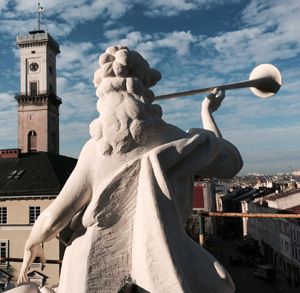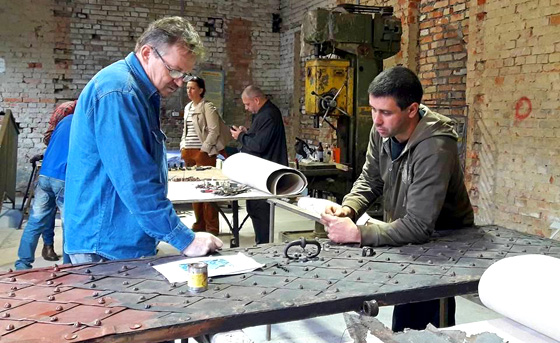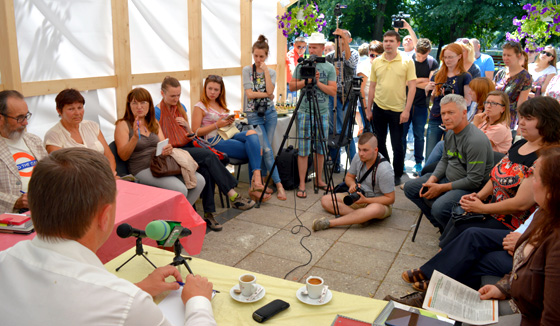Municipal development and rehabilitation of the historic centre of Lviv
Project description
Title: Municipal development and rehabilitation of the Old City of Lviv
Commissioned by: German Federal Ministry for Economic Cooperation and Development (BMZ)
Country: Ukraine
Lead executing agency: Ministry of Regional Development, Building and Housing and Communal Services of Ukraine
Partner: Lviv City Administration, Heritage Department
Overall term: 2009 to 2017

Context
Lviv (formerly Lwów/Lemberg) is located in a currently tense region of Eastern Europe. The city has great cultural and historical significance, and the medieval city centre has been listed as a UNESCO World Heritage Site since 1998. There are a range of challenges in preserving this heritage:
- Many of the buildings have been neglected for decades and are in a very poor state of repair.
- A lack of awareness and inadequate knowledge of correct building techniques usually pose more serious problems than raising funds.
- The prevailing conditions are not conducive to historically sensitive restoration of buildings in Old City districts.
- There is a lack of sustainable integrated urban development which plans for and considers the diversity of interests but also the challenges facing the city.
- A forward-looking, strategic and integrated approach to spatial planning is only adopted in isolated cases.
Objective
The urban renewal of Lviv's historic districts with their old buildings is managed sustainably and efficiently.

Approach
GIZ is advising Lviv City Council (the implementing partner), craftspeople, construction firms and local non-governmental organisations on innovative approaches for restoring the Old City; these advisory services include input from restoration experts.
With grant funding from Germany, selected buildings are undergoing sensitive restoration, which is combined with practical training. Since 2009, 20 per cent of heritage buildings in the Old City have been fully or partially restored in this way. They are recognised as examples of best practice in the restoration of historic buildings and also provide training opportunities for professionals such as craftspeople, architects and public officials. More than 500 employees of craft and construction firms have benefited from this upskilling.
Many restoration projects have focused on residential properties and public buildings such as libraries, museums and hospitals. Residents are participating in project implementation through financial contributions, contractual obligations, advisory services and consultations. More than 2,000 households in Lviv have benefited from the project’s funding programmes for property restoration.
Practical and planning needs were discussed in depth within the partnership framework and at numerous training events for the public authorities and local non-governmental organisations. Various tools have been produced in conjunction with the Ukrainian partners, including an integrated development concept for the historical inner city of Lviv, design guidelines and a brochure on citizen participation.
In order to ensure that a long-term approach to urban renewal is adopted, responsibilities were redefined on the basis of survey results and analyses. In 2016 and 2017, the advisory services provided by the project focused mainly on analysing decision-making processes relating to development and investment plans for the city as a whole and on producing a new management roadmap.
The Mayor of Lviv tasked the project with redesigning the management of integrated urban development in line with the city’s strategic vision and budgetary framework.
Numerous high-profile awareness-raising activities and events have taken place.
Results
With its wide range of activities, the project has achieved more transparent, efficient and sustainable governance of the cultural heritage, embedded in multisectoral, participatory urban development:
- restoration in combination with long-term intensive training and education programmes
- co-funding programmes with disclosure of construction budgets, selection procedures, evaluation criteria and timeframes
- urban renewal tools, the development of which also supports technical and organisational capacity building for officials.
Dynamic growth in the market for restoration services, driven by rising municipal expenditure on renovation, has led to a total of 20 new local craft enterprises being set up. These more highly qualified craftspeople and construction firms have successfully established themselves in the market. Property owners are increasingly prepared to invest in appropriate restoration measures, partly in response to the building professionals’ improved qualifications. Residents’ satisfaction with urban renewal has risen by 15 per cent since the project was launched. A new carpentry and restoration skills curriculum has been introduced at a vocational college, ensuring a continuous supply of well-qualified young artisans.
Integrated urban development tools and the associated public participation are now embedded in the decision-making process at political level. Interdepartmental cooperation is becoming more prevalent within the administration, with the City coordinating its policy measures and activities with key stakeholders. Lviv City Council, particularly the Mayor, Deputy Mayor and senior officials, are openly committed to good governance as an essential element of integrated urban development. The number of examples of participatory planning and implementation is rising. City officials regard them as fit for purpose, and these models are therefore in growing demand among municipal stakeholders. Lviv City Council’s Cabinet Member for Urban Development is supportive of a long-term approach to planning.
Civil society and increasing numbers of local residents are taking part in urban development consultations and planning. The nationally acclaimed and successful Maisternia Mista Urban Workshop has now been handed over to the City Council, which has been organising it on an independent basis since 2016. This annual event, which runs for several weeks, has been recognised since 2012 as an open platform for cooperation among diverse municipal stakeholders, including 50 non-governmental organisations, and attracts around 5,000 visitors every time.
Other towns and cities are learning from Lviv's experience with urban development and are adopting its tools, particularly the Urban Workshop, the design guidelines, the integrated development concept and the European Heritage Days.
Ukraine’s Ministry of Regional Development, Building and Housing and Communal Services now addresses urban development issues within the decentralisation priority of its reform agenda.
